Africa–Europe relations have for years been marked by an imbalanced donor–recipient relationship, with African governments seeking access to trade and aid preferences with the European Union (EU), while European leaders have cultivated privileged ties with African elites and ignored the needs of the continent’s younger generation. China’s investments under the Belt and Road Initiative (BRI) grab global attention, but it’s understood that the program is worsening Africa’s already high debt burden. Meanwhile, many countries on the continent are genuinely wooing another spectacularly pushy nation, Russia, even though the Wagner Group’s behaviour is reminiscent of the worst colonial memories in Africa. So starts the age of international rivalry for Africa.
EU & Africa – A Cooperation-turned-Partnership
Africa and Europe have a long history of relations that have been marked by an imbalanced donor/recipient relationship, with African governments seeking access to EU trade and aid preferences, while European leaders have cultivated privileged ties with African elites and ignored the needs of the continent’s younger generation. However, the Africa–EU partnership is an important platform for political and policy dialogues between the two continents.
The partnership is structured in three pillars reflecting the political, economic and development dimensions of the partnership.
In February 2022, African and European leaders agreed on a joint vision for a renewed partnership. The aims of the partnership are solidarity, security, peace and sustainable and sustained economic development and prosperity for the citizens of the two unions now and in the future.
The EU and the U.S. are hindered in their quest for influence by two main factors: a troublesome past and an adherence to democratic values.
Western European states must deal with the drawbacks of colonialism, while Americans must come to terms with their dishonourable role on the black continent during the Cold War (proxy wars, support for dictators) in order to win the trust of Africans.
Nevertheless, the West, and Europe in particular, has a strong presence on the continent, and the continent benefits greatly from it. The European Union and its members provide the most development aid in the world, about 75 billion euros in 2019 alone. About a third of this aid currently goes to Africa. “EU–Africa relations must go beyond the donor–recipient relationship”, says the March 2021 report by the European Parliament, which stresses the importance of supporting domestic production in Africa through sustainable investment. “The EU’s total trade with Africa is double that with China – which, by the way, is number two on this list. And the EU’s direct investment in Africa is three times that of China. The West is investing a lot to prevent famine in Africa and the region”, says Viktor Marsai, director of the Budapest Institute for Migration Research and an Africa expert.
The dominant role of the former French colonial masters must be emphasized. The renewal of France’s Africa policy is by no means revolutionary; President Macron has merely given new impetus to a process that has been underway since the second half of the 2000s.
France has a strong economic and cultural presence, especially in its former colonies, but takes a very different approach in its bilateral relations.
“Francafrique” is a thing of the past, Macron said, referring to the changed relationship. The French are represented in the Economic Community of West African States (ECOWAS). The organisation consists of fifteen member countries located in the West African region.
The French Central Bank dominates the monetary policy of states in the region, and the Alliance Française institutions, which promote French culture and language, are one of the most powerful instruments of French soft power in several countries.
One thing that is doomed to failure from the French perspective is the decades-long military campaign in the Sahel.
The Russian Way: Destabilisation, Propaganda, Wagner
Meanwhile, Russia has gained influence through the pro-Kremlin mercenary army, the Wagner Group, which filled out the power vacuum.
Over the past decade, the Wagner Group mercenaries have infiltrated the leaderships of the continent’s weakest states and sold themselves as a defensive power, using classic but also far cruder propaganda tools to incite the population against the West, which is at a disadvantage because of the memory of its colonial past.
This yields quick advances, and they even profit from it. The Russian leadership supports several companies that produce gems from gold, and they do so in defiance of various regulations.
The spectacular advance of the Russians is the best example of how they exploit the anti–Western sentiment of Africans. The process consists of mercenaries offering their services to the leaders of unsuspecting African states – as we have seen in Mali, Burkina Faso and especially in the Central African Republic – to get their hands on the valuable mines and industries of the state in question.
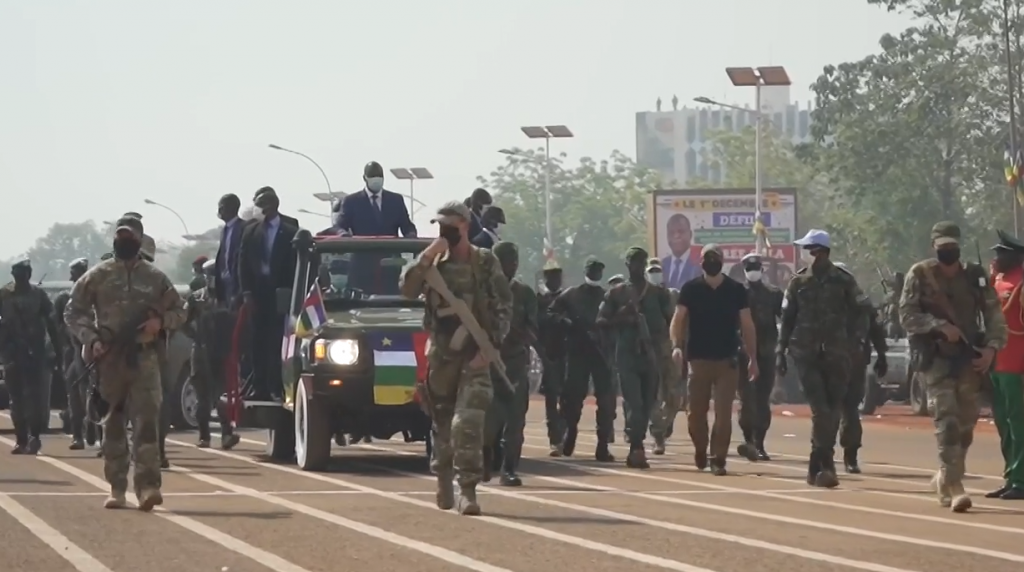
Russian mercenaries providing security for the President of the Central African Republic
(Photo: Wikimedia Commons / VOA / Clément Di Roma)
This is the umpteenth race for the continent. After the Soivet Union and the chaotic 1990s, the Putin-led state has returned with renewed interest in the black continent: Russian premier Vladimir Putin made his first major trip to Africa in 2006, followed by a trip in 2009 by then–President Dmitry Medvedev, who was nominally in charge of Russia at the time. But the project only really took off when Putin returned to the presidency in 2012, and it was not until 2019 that the first Russia–Africa summit took place. Putin announced then that he would double Russia’s trade with African countries within five years, and promised fighter jets and nuclear power plants for the continent. Since then, not much of that has come true.
According to IMF data, Russian–African trade will be only $15.6 billion in 2021, a quarter of what it was in 2018 and a dwarf compared to the equivalent figures for China and the EU.
But Russia is not the only country on the continent that is always looking to expand its influence. The other example that comes to mind is China.
China’s Decades–Long Lead
In the eyes of many, China is a threat to Africa. Those who hold this view believe that China is trying to “re-colonize” Africa. Those who hold this view mainly argue that Africans are disadvantaged by the competitive disadvantage of excessively cheap Chinese goods that constantly appear in already shrinking African markets.
Another view is that there is no exploitation – those who propagate this are the former colonialists – because China with its considerable investment, are developing the continent’s infrastructure. Without this, the mineral wealth is useless if it cannot get from the mining areas to the ports. In 2000, China established the Forum on China-Africa Cooparation (FOCAC), which meets every three years, institutionalising its Africa policy, which had previously been bilateral. The last of these summits took place in Senegal in November 2021, where China offered a $40 billion package for Africa’s development.
“Peace, development, equity, justice, democracy and freedom are common values of humanity and represent the abiding aspirations of both China and Africa. We both advocate a development path suited to our national conditions and are both committed to upholding the rights and interests of developing countries. We both oppose intervention in domestic affairs, racial discrimination and unilateral sanctions. We need to unequivocally stand for the just propositions of developing countries and translate our common aspirations and interests into joint actions” – runs an excerpt from the keynote Speech by Chinese premier Xi Jinping at opening ceremony of 8th FOCAC.
The Belt and Road Initiative, dubbed the “Project of the Century”, has promised Africans a series of mega-projects, including a sea route across Africa that pays homage to historical links with the Ming era. In addition, several African countries are among the founding members of the nascent Asian Infrastructure Investment Bank (AIIB), including Egypt and the Republic of South Africa.
Of course, there is no such thing as “small change”. China has made African countries borrow a lot. But the continent was a big consumer of Chinese loans long before the BRI project began.
They turned to Asia to escape the IMF and the World Bank, which would have expected market liberalization in return for the money. China had no such conditions. To increase their influence, they will lend money to any regime if it is in Beijing’s interest.
The U.S. and its European allies often attach political conditions to loans, which many African leaders see as interference by the former colonial powers and the U.S. in internal affairs.
It is a general belief – shared by the International Monetary Fund – that if governance in Africa does not become more transparent, if companies there are not integrated into the global supply system and if infrastructure remains weak, the continent will remain permanently financially dependent on the West, China and foreign private investors.
What Does The U.S. Want in Africa?
Among the Western powers, the U.S. is in an interesting position. According to Marsai, Africa is at the bottom of the U.S. geopolitical priority list. This has changed in the last 10 years: “The Americans have realised that they cannot let China have the rare earth metals like African cobalt and lithium if they are not somewhere,” he explains.
Last December, the U.S. organised a summit between Joe Biden and the leaders of 49 African states. This was the second U.S.–Africa summit, the first having been held in 2014 under President Barack Obama. The latter president was also responsible for launching the Power Africa programme. Power Africa. In addition, there is an older programme, Young African Leaders.
The West is trying to give some kind of response to the BRI. The G7, led by the United States, launched the Partnership for Global Infrastructure and Investment (PGII), a precursor to the so-called “Build Back Better World” (B3W) initiative, which was preached by President Biden at the G7 Summit in Cornwall in June 2021, but died after it was announced. The PGII is a very ambitious programme for which the U.S. and the G7 have committed to invest $600 billion by 2027.
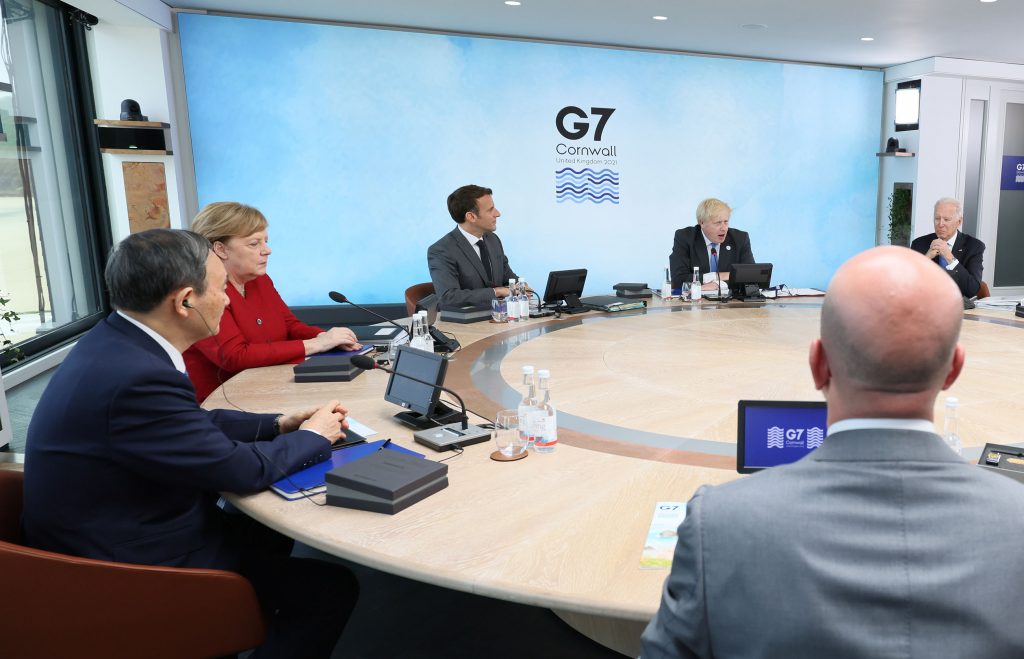
World leaders at the 2021 G7 Summit in England (Photo: Wikimedia Commons / Prime Minister’s Office)
China is an increasingly influential player in world politics and the global economy, including on the black continent. With its huge sums of money and investment, it could easily replace traditional EU aid policies, which are firmly rooted in outdated white saviour narratives. For the West – especially the European Union – it will require changing the toxic debate on migration, implementing a new EU anti-racism agenda and intensifying work on international partnerships.

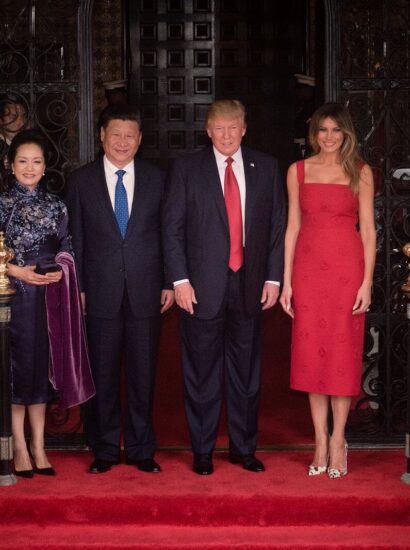
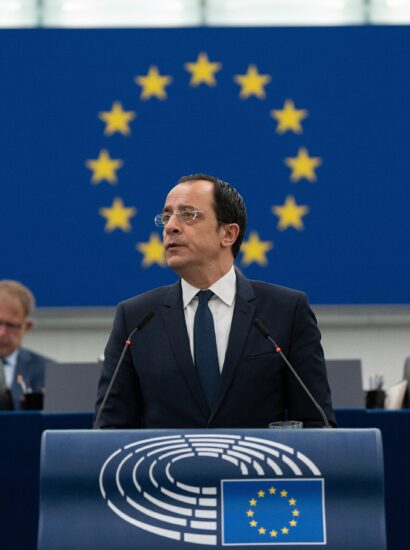
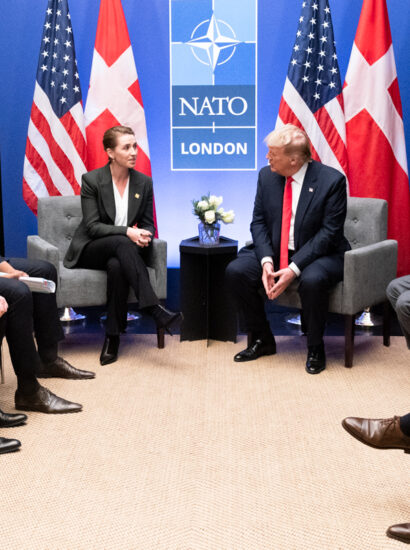
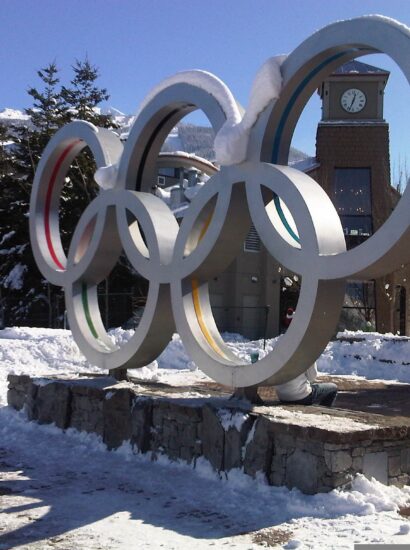
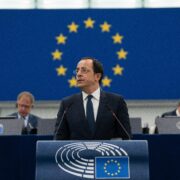

[…] Russia will also need allies on the international scene and it can get new ones relatively cheap in Africa as thanks to its troll army, it already has “projects” going on […]
[…] In the case of TAP, it is important to ensure strategic routes, such as those to Brazil or the former Portuguese colonies in Africa. […]
[…] do not happen overnight. Recently introduced policies, such as the Mattei Plan, aim to encourage investments in African countries to reduce migration to Italy. This approach seeks not only to address the root causes of migration […]